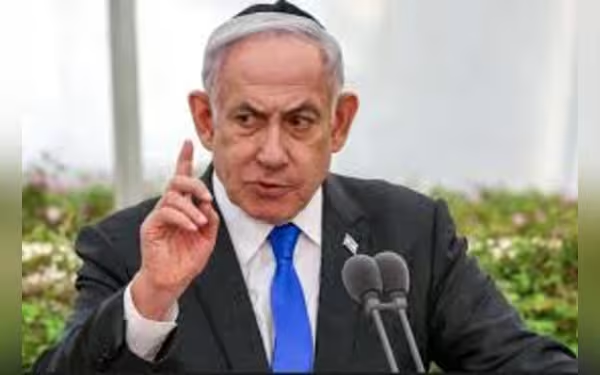Sunday, December 22, 2024 07:55 PM
Netanyahu Warns Iran Over Nuclear Ambitions Amid Diplomatic Tensions
- Netanyahu vows to prevent Iran's nuclear capabilities.
- Iran considers revising nuclear doctrine amid sanctions.
- Escalating tensions following missile attacks and military strikes.
 Image Credits: thefrontierpost
Image Credits: thefrontierpostNetanyahu warns Iran against nuclear ambitions as tensions rise over potential policy changes amid sanctions.
In recent developments, Israeli Prime Minister Benjamin Netanyahu has reiterated his commitment to preventing Iran from acquiring nuclear weapons. This statement comes in the wake of remarks made by Iran's top diplomat, who suggested that Iran might reconsider its nuclear policy if Western sanctions are reinstated. The ongoing tensions between Israel and Iran have escalated, particularly as Iran prepares for crucial nuclear discussions with European nations.
Netanyahu emphasized in an interview that Israel would utilize all available resources to thwart Iran's nuclear ambitions. He stated, "I will do everything to prevent it from becoming a nuclear (power)." This declaration underscores Israel's longstanding position as the only nuclear-armed state in the region, which has made it a priority to ensure that no rival nation can match its military capabilities.
The backdrop to these statements includes a recent ceasefire in Lebanon, which Netanyahu believes will allow Israel to concentrate its efforts on Iran. However, he did not specify what actions Israel might take in this regard. Over the past year, Iran has launched missile attacks against Israel in retaliation for the deaths of key figures from Hamas and Hezbollah, as well as an Iranian general. Israel has responded with limited military strikes on Iranian targets.
Iran's Foreign Minister, Abbas Araghchi, has expressed frustration over unmet commitments from Western nations, particularly regarding the lifting of sanctions. He warned that this dissatisfaction is leading to discussions within Iran about potentially altering its nuclear doctrine. In an interview, he stated, "There is this debate going on in Iran, and mostly among the elites … whether we should change our nuclear doctrine." This reflects a growing concern in Tehran about the effectiveness of its current nuclear policy.
The 2015 nuclear agreement aimed to provide Iran with relief from severe sanctions in exchange for limiting its nuclear program. However, following the United States' withdrawal from the deal and the reimposition of sanctions, Iran has gradually increased its uranium enrichment levels, now reaching 60 percent, which is significantly closer to the threshold needed for nuclear weapons.
As Iran engages in talks with Britain, France, and Germany, the stakes are high. The discussions come just weeks before Donald Trump is expected to return to the White House, a development that could further complicate Iran's diplomatic efforts. The Iranian government is keen to avoid a scenario where it faces renewed pressure from both the United States and European nations.
The situation remains tense as both Israel and Iran navigate a complex web of diplomatic relations and military posturing. The outcome of the upcoming talks could have significant implications for regional stability and the future of nuclear non-proliferation efforts. As the world watches closely, it is clear that the stakes are high, and the need for a peaceful resolution has never been more critical.













